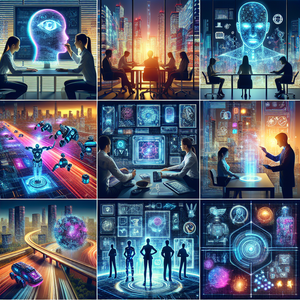Transitioning from Statistics to AI and Machine Learning: The Path to High-Demand Tech Careers

Statisticians are well-suited for AI and ML due to their expertise in data analysis and statistical methods. AI and ML rely on concepts like probability, regression, and optimization, which are core to statistics. Techniques like supervised learning and unsupervised learning mirror statistical modeling and methods like clustering and PCA. Additionally, statisticians possess analytical mindsets, enabling them to interpret data, identify patterns, and solve problems effectively—skills critical for AI and ML roles.
Skills Statisticians Need to Acquire
Statisticians transitioning to AI and ML must master additional skills, including programming (Python, SQL, Java, or C++), machine learning algorithms (decision trees, SVMs, neural networks), big data tools (Hadoop, Spark, AWS), and deep learning frameworks (Keras, PyTorch, TensorFlow). Domain knowledge in specific industries like healthcare or finance can also provide a competitive edge.
Steps to Transition into AI and ML
Statisticians can transition to AI and ML by upskilling through online courses, gaining practical experience with real-world datasets, leveraging transferable skills like statistical modeling and problem-solving, networking within the tech industry, and considering advanced education or certifications in AI, ML, or data science.
Real-World Success Stories
Many statisticians have successfully transitioned to AI and ML roles across industries. For instance, Dr. Fei-Fei Li combined her background in statistics and neuroscience to innovate in computer vision. Statisticians in healthcare design AI-driven diagnostic tools and predictive models, while those in finance optimize trading strategies and detect fraud using ML.
The Future of AI and ML for Statisticians
The demand for AI and ML expertise is growing globally, offering statisticians a chance to future-proof their careers. By embracing these fields, statisticians can contribute to transformative technologies like autonomous vehicles and robotics, stepping beyond traditional roles to become innovators in cutting-edge industries.
For statisticians facing career uncertainty, transitioning to AI and ML represents a natural evolution. By acquiring new technical skills, gaining practical experience, and leveraging their data expertise, statisticians can secure fulfilling, future-proof careers in these rapidly growing fields.
Machine Learning Engineer
Google, Amazon, Meta, and startups focused on AI-driven products
Job Description
Design and deploy machine learning models to solve real-world problems, such as recommendation systems, fraud detection, or predictive analytics.
Develop and optimize algorithms using tools like TensorFlow, PyTorch, and Scikit-learn, ensuring scalability and efficiency.
Collaborate with data scientists and software engineers to integrate ML models into production systems.
Unique Skills
Expertise in deploying models in cloud environments (e.g., AWS SageMaker) and knowledge of MLOps pipelines for model monitoring and retraining.
Data Scientist (Specializing in Predictive Modeling)
Financial institutions (e.g., JPMorgan Chase, Capital One), e-commerce platforms, and healthcare providers
Job Description
Use statistical methods and machine learning techniques to analyze historical data and build predictive models for business forecasting.
Gather, preprocess, and analyze large datasets using Python, R, or SQL to extract actionable insights.
Present findings to stakeholders through compelling visualizations using tools like Tableau or Power BI.
Unique Skills
Strong foundation in statistical modeling, such as regression analysis and time-series forecasting, combined with domain expertise in a specific industry.
AI Research Scientist
OpenAI, DeepMind, Microsoft Research, and academic institutions
Job Description
Conduct cutting-edge research in artificial intelligence, focusing on areas like deep learning, natural language processing (NLP), or computer vision.
Design and experiment with advanced algorithms, including neural networks, reinforcement learning, or generative models.
Publish research findings in peer-reviewed journals and present at conferences to contribute to the academic and industry AI community.
Unique Skills
Strong theoretical knowledge of AI/ML, Ph.D. in a related field, and proficiency in mathematical modeling.
Data Engineer (Specializing in Big Data and AI Pipelines)
Netflix, Uber, IBM, and large enterprises with AI-driven platforms
Job Description
Build and maintain data pipelines that prepare, clean, and process massive datasets for machine learning and analytics teams.
Utilize tools like Apache Spark, Hadoop, and Kafka to manage distributed data systems and enable real-time data processing.
Collaborate with AI teams to ensure data accessibility and scalability for model training and inference.
Unique Skills
Expertise in ETL (Extract, Transform, Load) processes and proficiency in cloud platforms like Google BigQuery or AWS Redshift.
NLP Engineer (Natural Language Processing Specialist)
OpenAI, Grammarly, Salesforce, and companies focused on conversational AI
Job Description
Develop AI models for text-based applications, such as chatbots, sentiment analysis, and language translation.
Implement state-of-the-art NLP techniques, including transformers (e.g., BERT, GPT), tokenization, and text embeddings.
Fine-tune pre-trained language models for specific industry use cases, such as customer service or legal document review.
Unique Skills
Strong programming skills in Python, hands-on experience with NLP libraries like Hugging Face, and proficiency in linguistics or semantic analysis.


